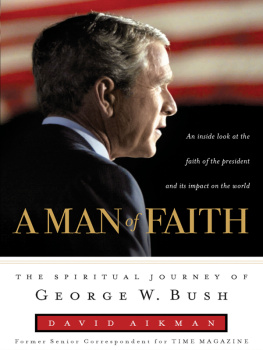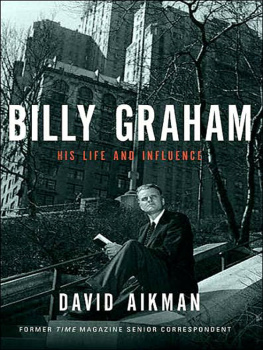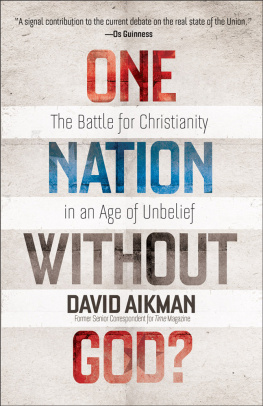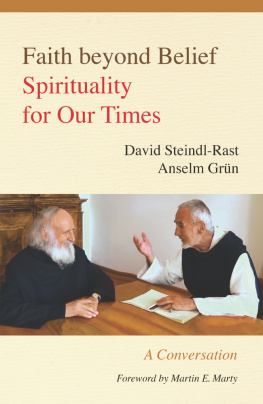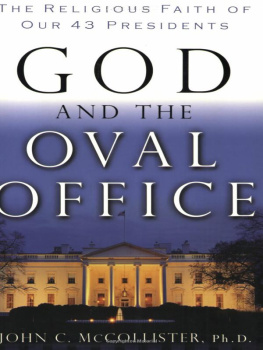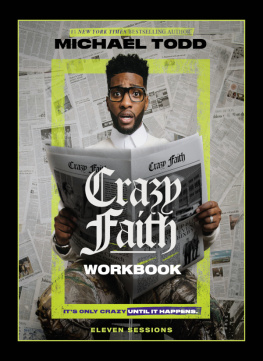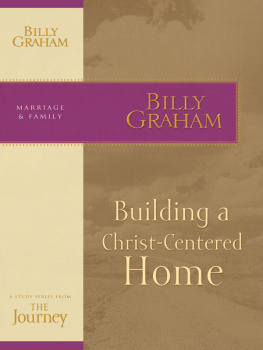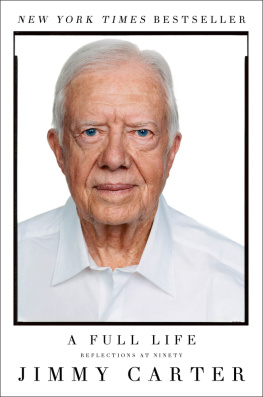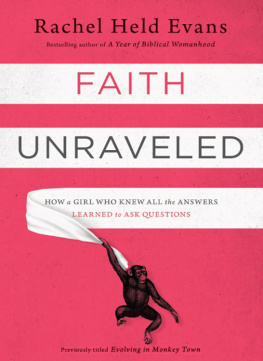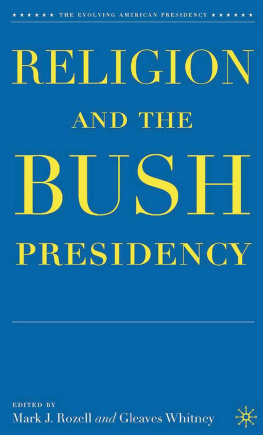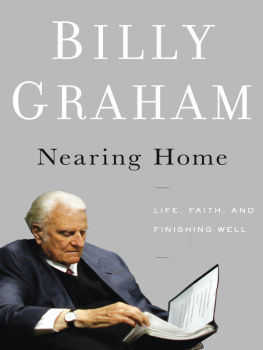A MAN of FAITH
A MAN of FAITH
The Spiritual Journey of George W. Bush
DAVID AIKMAN

A MAN OF FAITH
2004 by David Aikman.
All rights reserved. No portion of this book may be reproduced, stored in a retrieval system, or transmitted in any form or by any other meanselectronic, mechanical, photocopy, recording, or any otherexcept for brief quotations in printed reviews, without the prior written permission of the publisher.
Published by W Publishing Group, a Division of Thomas Nelson, Inc., P. O. Box 141000, Nashville, Tennessee 37214.
W Publishing Group books may be purchased in bulk for educational, business, fundraising, or sales promotional use. For information, please e-mail SpecialMarkets@ThomasNelson.com.
All Scripture quotations, unless otherwise indicated, are taken from The New King James Version. Copyright 1979, 1980, 1982, Thomas Nelson, Inc. Used by permission.
Scripture quotations marked NIV are taken from the Holy Bible, New International Version. Copyright 1973, 1978, 1984, International Bible Society. Used by permission of Zondervan Bible Publishers.
Photographic research and acquisition provided by Creative Solutions, Atlington, Texas.
Interior design by Inside Out Design & Typesetting, Fort Worth, Texas.
Library of Congress Cataloging-in-Publication Data
Aikman, David, 1944
A man of faith : the spiritual journey of George W. Bush / David Aikman.
p. cm.
Includes bibliographical references.
ISBN 0-8499-0870-1 (tp)
ISBN 0-8499-1811-1 (hc)
1. Church and stateUnited States. 2. Bush, George W. (George Walker), 1946 Religion. 3. United StatesReligion.
I. Bush, George W. (George Walker), 1946 II. Title.
BR516.A45 2004
973.931' 092dc22
2004002069
CIP
Printed in the United States of America
05 06 07 08 09 RRD 5 4 3 2 1
This book is dedicated
to all who love the United States
and who pray for the nation
and its leadership.
CONTENTS
M ANY PEOPLE HAVE MADE THIS BOOK POSSIBLE. I would like, first, to thank President George W. Bush for agreeing to allow me to speak with some of his close Christian friends, family members, and associates. These include Secretary of Commerce Don Evans, Senior Political Advisor Karl Rove, former White House communications director Karen Hughes, Pastor Mark Craig of Highland Park Presbyterian Church in Dallas, Texas, Pastor Jim Mayfield of Tarrytown Methodist Church in Austin, Texas, Barbara Bush, and Michael W. Smith. Karl Rove acted as intermediary for my conversations or meetings with the above.
In Houston, Texas, Pastor Ed Young was hospitable, helpful and insightful. I much appreciate the patient willingness of B. J. Goergen in Karl Rove's office to pass messages back and forth during sometimes very busy periods in the White House.
In Midland, Texas, I owe a great debt to the generous assistance of Don Poage and Jim Sales.
At W Publishing Group, I deeply appreciate the friendly support and interest throughout the project of David Moberg and Greg Daniel.
My primary research assistant from the outset of the venture, Diane Bryhn, gathered material of invaluable usefulness from many different directions and was a constant source of good suggestions and helpful contacts. During the writing phase a good friend in Beijing, Charlene Fu, did sterling and very fast work editing the material and making it far more palatable than it would otherwise have been. Needless to say, all factual mistakes and stylistic solecisms are entirely my responsibility.
I am very grateful to Deal Hudson, editor of Crisis magaazine, and Ambassador Mercer Reynolds, for their kind assistance in putting this book together.
I would like to thank David Sutherland, resident of Hong Kong, for generously inviting me to the Philippines to participate in a seminar called "Vacation with a Purpose," and for tolerating my spending long hours there completing the book.
I would like to thank my family: my wife Nonie, my two daughters Abbie and Amanda, and our dog Chip for putting up with me as I beavered away for unreasonable hours in my office at home.
When you turn your heart and your life over to Christ, when you
accept Christ as the Savior, it changes your heart.
It changes your life. And that's what happened to me.
GEORGE W. BUSH
T HE GREATER DES MOINES CIVIC CENTERa large, crisply modern, concrete structure on Walnut Streethas a capacity of close to three thousand people, but on the evening of December 13, 1999, it was by most estimates only half-full. The tickets for the event were free, and about twenty-four hundred had been handed out by Iowa Republican Party activists to likely, or at least possible, audience members. Obviously, some of the recipients decided to stay home.
The weather in this city in the very heart of the United States had turned chilly, and local weathermen were forecasting the imminent arrival of the first of the winter storms that can sweep over the Plains states from late November onward. But the mood in the civic center was upbeat, even festive. After all, this was the first debate in Iowa among the Republican Party's six presidential hopefuls. Several partisans of the six candidates had shown up wearing T-shirts supporting their heroes: Gary Bauer, Governor George W. Bush, Steve Forbes, Senator Orrin Hatch, Alan Keyes, and Senator John McCain.
The event was jointly hosted by NBC and the local Des Moines affiliate on WHO-TV, Channel 13. The cohosts were Tom Brokaw and WHO's talented and sharp local anchor John Bachman. The Iowan had flown to New York to discuss with Brokaw how the debate should be handled.
"Let's open it up and have it more freewheeling," Brokaw had suggested, and Bachman readily agreed.
The Iowa caucuses were still six weeks away, and all the candidates had also been stomping through New Hampshire preparing for the primary scheduled February 1, 2000. Tonight would be the best opportunity for a national television audience to see the six presidential hopefuls up-close, sparring among themselves.
A dark-blue stage background provided a minimalist setting for the candidates, who were seated onstage, side by side on the kind of chairs often found outside the human resources office of a Silicon Valley startup. The candidates all wore dark-gray or dark-blue suits and simple red or blue ties; it was a uniform that made it clear that they all belonged to the same club. Indeed, in a way, they dida Republican Party eager for political power after seven years of a Democratic White House.
The "freewheeling" rules of the debate allowed candidates to ask questions of each other and, if they felt the urge, to jump in with a comment on something any of the others had said. There were no bells or buzzers cramping this loose style. Still, for the first several minutes there were no pyrotechnics. The questions, first to Senator McCain, focused on the tragic Columbine High School shooting in 1999 and what might have caused such terrible behavior among American schoolchildren, on federal involvement in health insurance programs, on ethanol, on trade with China, on the Test Ban Treaty, and on tax cuts.
Then Bachman took the microphone from Brokaw and announced that he had a question for the candidates from "the good folks of Iowa," meaning that he had winnowed it out from a collection of questions submitted in advance by viewers.
"What political philosopher, Mr. Forbes," he asked, "do you most identify with and why?" Then he paused half-apologetically and added, "Which gives the remaining five time to think. Im sorry." The audience chuckled loudly.
Next page
